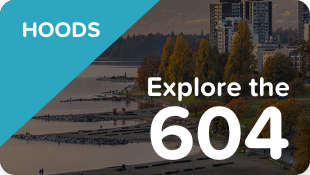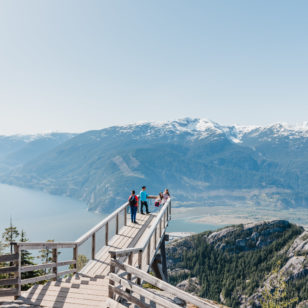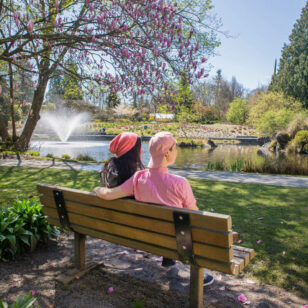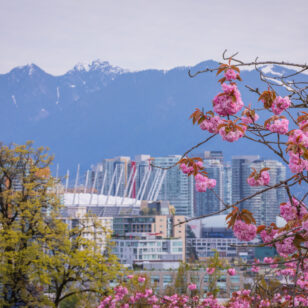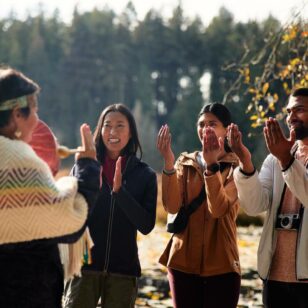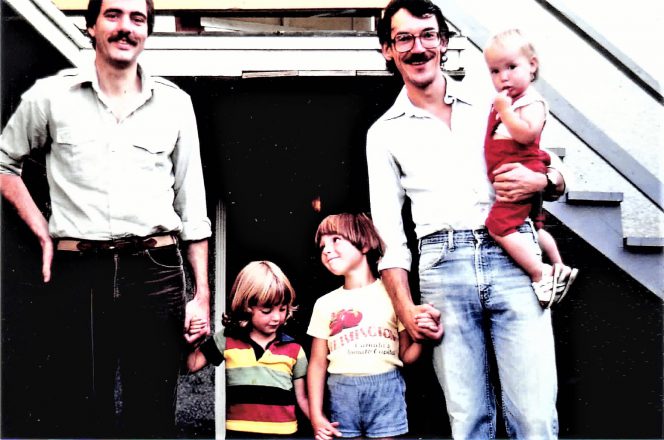
By Angus Praught
Deputy Mayor Tim Stevenson and Very Reverend Dr. Gary Paterson are a high-profile Vancouver couple, and champions of LGBTQ2+ rights and freedoms. For decades, they have been at the forefront of life-changing legislature and religious reforms that have helped shape Vancouver into the diverse and inclusive city it is today.
In Part 3, the final part of this series, we will be speaking with Deputy Mayor Tim Stevenson and Very Reverend Dr. Gary Paterson as an openly gay married couple, how they first met (in the years before marriage equality in Canada), some of the challenges they faced, and how life has unfolded for them in the public eye over the years.
Angus Praught: Good afternoon and thank you for speaking with us again. It’s public knowledge that you have been an openly gay couple for many years, and today we would like to ask you a few questions about your relationship and experiences, if you don’t mind. Can we start by asking when and where you first met?
Very Reverend Dr. Gary Paterson (VRDGP): We first met ironically at the United Church Provincial Conference Meeting in 1980. I was still a married person and not at all out, struggling with my sexuality and Tim had come to that conference as an openly gay person, who had decided to enter into the journey into ministry. We met and there was a friendship and a lot of support between the two of us. Shortly thereafter I entered into a two year process of counselling with my then wife, and we slowly made a decision that ending the marriage was the healthiest thing for ourselves and for the three children, that were one, three and five at that point. The decision was that I would go my way and she would go hers. Within a couple of months, Tim and I realized that our friendship had blossomed into a relationship, and we made our commitment in June of 1982. Ironically and strangely my former wife fell in love with a woman shortly thereafter, and they’ve been together for thirty-six years as well. In fact, we did their legal marriage a number of years ago. So we have sometimes seen ourselves as a family of two, a gay couple, but we were also parents with three little children, and these three daughters would live with us for one week and then live with my former wife and her partner for one week. We learned the intricacies of what family life meant, how to be a family of two, how to be a family of five, and strangely enough how to be a family of seven, which included joint Christmas celebrations at both homes.
Deputy Mayor Tim Stevenson (DMTS): In fact we did not only Christmas, but we did all High Days and Holy Days together, all birthdays, Thanksgiving and Easter, as a family of seven.
VRDGP: We even did a number of holidays, and occasionally we said, “too much of a good thing…” but by and large, with lots of conversation and real commitment, to both the health of the relationship between us and a huge commitment to the well-being of the kids, we accomplished something quite remarkable and amazing.
AP: Were there any challenges to being public about your lives at that time?
DMTS: One of the concerns we had really early on, was the whole area of legality. We were very vulnerable because people could lay complaints; you know those gay people and those lesbians have kids. So we never wanted to go near a court, because you just didn’t know, and as gay people you just didn’t have any rights, we were just getting basic rights at that time.
VRDGP: So there was a real apprehension, that if custody emerged, that the court may make a decision, contrary to what we knew worked for both us and for our children, and we had always put the children first, and always were attentive to what they needed. In fact, for instance, as a family of seven we made a commitment that nobody would accept a job offer outside the city, without a full family consultation. There was a time when I had possibly hoped to move to Toronto and the family said no, and there was a time when my wife’s spouse wanted to go to Saskatoon, we had a conference, and we said no. We also made a commitment to never live more than five or ten minutes apart from the children, so that they would have similar parks, similar schools, and similar friendship circles, so there wouldn’t be a house way over here, and then a different house with different rules and standards. So we did a lot of work together as a foursome, to say what were our common values, and our common beliefs about parenting.
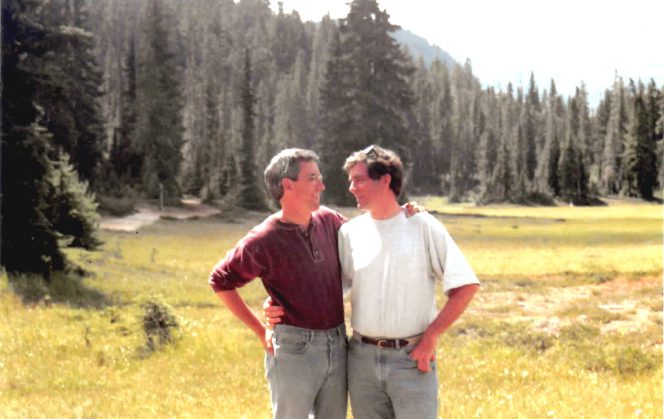
Can I add one more thing, because I want to throw out a huge affirmation of the role that Tim played; you need to imagine a thirty-something gay man who had been involved deeply in the community, suddenly becoming the stepfather of a one, three and five year old. I just immediately said, suck it up, that’s what we do and by the way dinner’s at 5:30. We would find ourselves out on Friday night, and suddenly saying at 10:00, just as things were getting going with gay friends, that we have to get going to let the babysitter go home. And Tim did, in fact, take it in stride and was totally present for the kids and was completely and absolutely another dad that they were able to learn from and be supported by, but it took sacrifice that I did not recognize until later, how much and how deep it was.
AP: Did you experience any awkwardness from neighbours or with people in the LGBTQ2+ community about your family situation?
VRDGP: It was a dilemma, I think, for gay and lesbian families forming and shaping our families in the 80s and 90s where we were a bit on an anomaly. Many of our heterosexual couple friends said it feels strange, two gay men and three daughters, and how do you parent? Many of our gay friends also said it felt strange, two men and three daughters, and we don’t have much understanding of that. For example, when the last of our daughters was no longer needing diapers we did what we called a pamper dance, throwing diapers all over the place, and not many gay guys had much understanding or sympathy with that. When we were looking for babysitters, some of the neighbours were saying, where’s the mom, and we had to say no, we are the parents. However, we were able to work through local churches that knew us as people of faith and said we will vet and guarantee that these two guys are not going to be predators on any babysitter that came in. It was a real challenge.
AP: When did you get legally married, and did you do this in a public venue?
VRDGP: The legislation changed around July, 2003, here in British Columbia and we made a decision that we would delay our legal marriage to June 15, 2004, and we simply had a very private ceremony with a handful of friends. The reason we did that was that a few years earlier, we had done what we considered our marriage. We had actually gone to church and had a full scale wedding, with the family, the full service, the promises, the vows, the reception and the party after. The United Church had come to the stance of doing holy covenants, and they actually kept records and issued certificates, even though it wasn’t recognized as legal in the eyes of the state. So we felt that we had actually become married in the eyes of family, community, public, God and church, and it was simply the “state” which had been slow in catching up. So when finally the legislation emerged, we even wondered if we should do it, simply because we knew we were married and thought no, in fact this is a significant step, but it was more like crossing T’s and dotting I’s. Just as a matter of fact, our relationship started in 1982 as a committed relationship and there was no way of doing any kind of public ceremony, and so we had a very private time and ceremony between ourselves where we made our own vows of commitment to each other and that marked June of 1982 was the date that we were personally married and then on June 15th, at the turn of the 21st century, we said that we are married publically and then in 2004, in the eyes of the state.
AP: You have done many things publically as a gay couple, one of which has been appearing together for the panel discussion at the pride proclamation and flag raising at Vancouver City Hall. Do you recall the first time this took place, as well as some other instances where you appeared publically as a couple?
DMTS: Well, I think it was 2012. There had been some panel discussions in previous years, and we always had a moderator. Fred Lee was a moderator one year, I was a moderator one year, and then I thought it would be good to have Gary as a moderator, he’s very good at that sort of thing, and that year I just had an introductory role, and then handed it over to Gary. That was the first year that Gary was really involved in the whole thing, with the flag raising and so on.
VRDGP: There were a number of more public events, where we appeared as a couple, not trying to make a statement, but implicitly a statement was being made. One actually was the moment when I was elected as Moderator of the United Church, in 2012, and I was called up on stage, and there was applause and people were cheering, and then I invited Tim onstage, saying I would like to invite my spouse. And then we publically embraced, which I think was a first for the church, to suddenly see two men, married and in love and embracing, and so clearly affectionate, both laughing and crying. There was just this incredible support and real support from the gathered community; they recognized that we were not just “two gay men”, but two people who were committed, who loved each other, and loved God.
One other thing that is maybe worth mentioning was in 2014, World Pride Day was held in Toronto, and we joined the religious contingent, and walked hand in hand. I was the moderator at that point, and that was one of the few times when I would actually wear the black shirt and clergy collar, and Tim had purchased a beautiful rainbow stole for me, that came from Guatemala, and so there we were, marching hand in hand, down Yonge Street as a gay couple on World Pride Day, so that just felt special.
AP: As a high profile professional couple, your demanding careers can have added challenges to face publically. One such instance was when Gary was elected as the moderator for the United Church in 2012, which I believe took you to Toronto for a three-year period, while your career, Tim, kept you in Vancouver. How did you manage this as a couple?
VRDGP: Well that is an interesting question, and it was a challenging time. When I was elected, I was given just as a thumbnail sketch; you’ll spend a third of your time in Toronto, a third of your time on the road, across the country and around the world, and a third of the time at home. My family actually said they lost, that there was actually less than a third of my time at home. So it was a long stretch, we phoned each other almost every day and every night, took advantage of social media, but also Tim was also able to spend a lot of time coming to visit. I’m so grateful to city council, who sometimes gave him a three day leave of absence; they knew us, and were supportive and recognized the need to come together, so there were a lot of trips to Toronto. We also tried to arrange particularly my international travel at a time when Tim would be able to join me. For example, when I went to the World Council of Churches in Korea, Tim was able to come, and as I mentioned earlier, in our travels to Columbia and Cuba as spouse, which the church supported.
DMTS: I remember when Gary got elected, and all the excitement around that, and then we got on the plane in Toronto to come home. Half way along thinking about this, I started to cry and I turned to Gary and said “what have we done”. I realized this was all great, but also meant three years of Gary in Toronto, and me in Vancouver, and how were we going to deal with that. I had gone to South Africa for six months, and California for six months previously, but this was a three year commitment. But the church was great, I was able to visit Toronto when Gary was not able to leave, and there were conferences and so on that I attended, that allowed stop overs in Toronto, and our council and caucus were really good in realizing we were going through this. When you’ve got careers like we both have, where there’s so much going on in your lives, both with City Hall and the national church, and you don’t really have people to talk to as a lot of it is confidential, we would only have each other, and we talked a lot, almost every day.
VRDGP: And so we went through that part, and emerged stronger than ever.
AP: Another highlight was when you were recognized by being awarded the Queen Elizabeth II Diamond Jubilee Medal for your respective achievements in church and civic leadership. However, I believe you were nominated separately, but in the end both were awarded the medals. Can you share some of your thoughts and feelings from that time?
DMTS: Well, I was sure glad that I got one too (laugh), you know, it would have been totally unfair if just he got his. I mean, I think it was significant, the Jubilee was an important milestone for Canada and Britain and people received this for their contribution so it was very nice to get it. There are also public events where I get to wear it, such as at the Cenotaph on Remembrance Day.
VRDGP: And I agree, it carries some significance, that larger recognition of the role that one has personally played within a political, religious, or more broadly the community sector, and to be affirmed, and also to be affirmed as a gay person, that really marks the kind of journey our community has experienced over the last fifty years. On a more personal note, as with Tim’s laughing, I felt the same way (smile), so it was really lovely, from separate venues and sources to both be equally recognized at such a moment, and to affirm what we already experience, that we feel far less competitive and far more supportive of each other.
AP: You are both nearing retirement. Any plans you can share with us?
DMTS: Well, I really want to travel for a chunk of time after I leave city council. I’m still going to be teaching half time at Langara, so I will have to be travelling in the off semesters, so immediately after I will be off for January, February, March, April. We’re going to go away, we’re going to south Asia for a bit, Vietnam and Cambodia on a gay tour, and then to Sri Lanka for a bit, and then to Australia, my sister lives in Australia. So those are the plans right now, and after being in politics for so long, it’s really hard to turn off the brain, so I really want to just be able to get away, and not really know what’s happening in Vancouver, hopefully for a bit. When I come back, one thing I’ve been looking into for a while is photography, and I would like to get involved in that more. But then I am also open, as I always felt that you cannot move into something new, until you let go of what you’ve got. So I’m hoping that in letting go of political life, and the time that I’ve committed to that will open other doors. As I said, we love travel, and we plan to do quite a bit of that.
VRDGP: Very similar, with recognition that we’re moving slowing into this retirement. Both of us excited and a little apprehensive, so we’re both going to be working half time, and trying to discover what else will emerge. We’ve had some friends who’ve said, oh you guys have worked so hard it’s now time to just kick back and really enjoy. Part of our response is, but we’ve actually really enjoyed the work we’ve done, it’s not that it’s been a hardship. It’s been exhausting at times, but it has been a joy and such an important part of not just our work, but who we are, and how we see ourselves contributing to the community. So in some ways, we want to continue doing that, but relax a bit more, and travel. I did a count, and Tim has actually been in sixty five to seventy different countries; I’m a bit behind, but am eager for the excitement and adventure. And on a personal level, I would love to do some more writing, I have a couple of books in mind, who knows if they’ll ever come to pass, I’m a closet poet, and who knows what will emerge from that. I like music, but haven’t had the time to work on the piano, I have a saxophone in the closet, a guitar in the basement, and I’ve sung in the choir a couple of times. So moving into the world of music, and recognizing as Tim said, we come from a tradition where perhaps the new will not emerge until the old passes away. Our central figure, using religious language, is crucifixion and resurrection; there needs to be a death, before there is new life. So clearly part of it is going to be learning to let go, and having trust and faith that new opportunities will emerge.
AP: Thank you both very much.
DMTS/VRDGP: Thank you. It was our pleasure.
2018 is turning out to be another year of firsts for the city of Vancouver, as well as a year of major political change. It will be fascinating to see what the future holds.
Angus Praught is president of Gayvan.com Travel Marketing, a Vancouver-based company featuring LGBTQ2+ welcoming destinations, in the Vancouver region, Canada, and beyond.
Sign up for the Out In Vancouver newsletter if you are interested in hearing about more non-heteronormative news, events, and culture that are part of Vancouver’s cultural mosaic, and to get notified on the latest contests.










